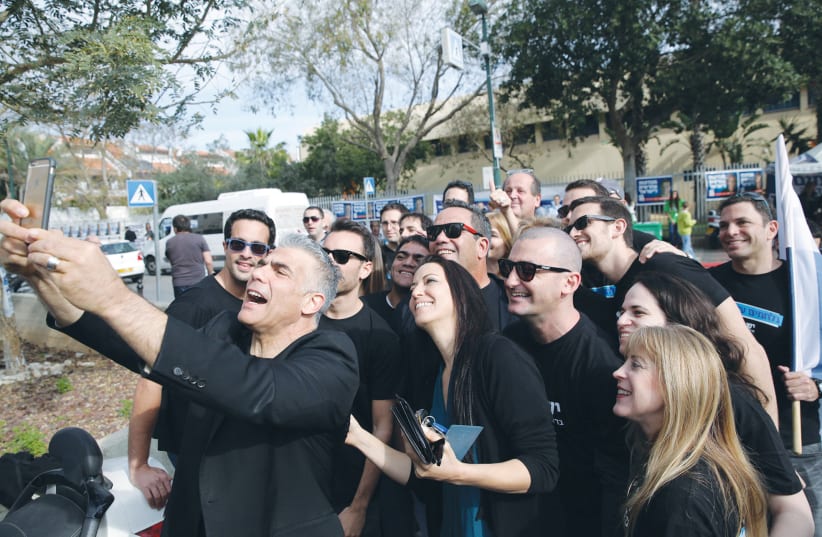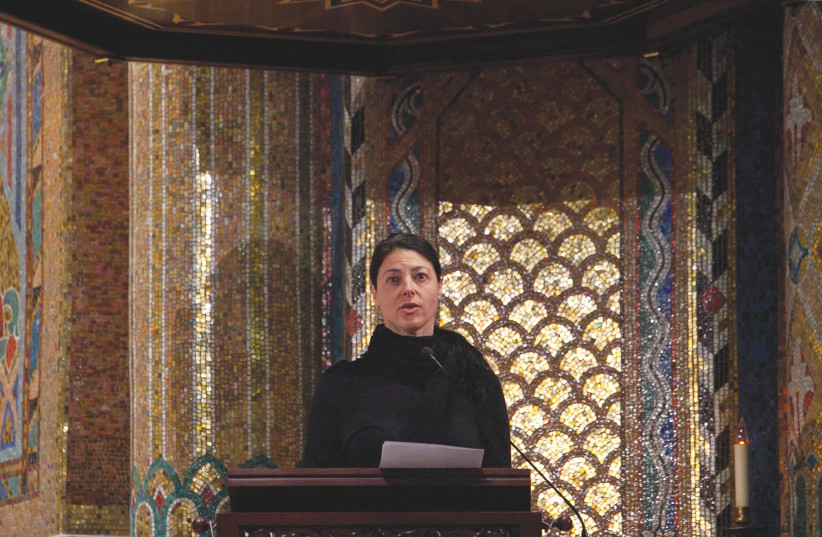Early this week, Foreign Minister Yair Lapid and his journalist wife, Lihi, received a WhatsApp from their son Yoav to tell them that he was engaged. The younger Lapid was vacationing in Paris with his girlfriend, Shay Alalo, where he popped the question in what is widely believed to be the most romantic city in the world. The news of his new status was accompanied by a photograph of the couple with Alalo displaying her engagement ring. The groom-to-be’s parents were ecstatic, and his father wrote in response:
“One day my son, in many years, you will realize that this morning was the most important day of your life. Your father wrote books and poems, was the presenter of TV shows, started a party and even a government, but still the most important thing I’ve done in my life, without competition, is to be Lihi’s husband and father of all three of you.
“Yoavi, you’re about to marry one of the most charming and intelligent young women I’ve ever met. She also connects us with a wonderful family and parents we love dearly. Lihi and I are happy with them, and I think they are also with us. At our age, we know that a person does not marry only a son or a partner, but also their family. In Shay’s case, we made a great deal.
“But not like the deal you made. Hereby you follow in the footsteps of your father and your grandfather – we also got married better than we deserved. In the next dozens of years, you will compensate Shay by carrying her in your hands as she deserves, love and respect her, and especially explain to her that the most important thing in the world is that every Friday night you have to come to dinner at your parents.
With love,
Dad”
■ JUST BEFORE returning home from the US with her infant son, Uri, Labor Party chairwoman Merav Michaeli, who has been running the party and the Transportation Ministry remotely, met up with Elizabeth Shuler, the recently elected president of the American Federation of Labor and Congress of Industrial Organizations. Like Michaeli, Shuler has a background in journalism, but whereas Michaeli is the second woman after Golda Meir to head the Israel Labor Party, Shuler is the first woman to be elected president of the AFL-CIO. At age 51, she is also the youngest person to hold the position. Accompanied by her good friend Randi Weingarten, who is president of the American Federation of Teachers, Michaeli met Shuler, whom she told that her paternal grandfather Nechemia Michaeli was the last secretary general of Mapam, a political party that championed the workers and sought to secure their rights. “I was raised in a home where the fights for equality and peace were not politics, but rather life itself,” she said. “It was from that place that I came to the Labor Party which I am working to rebuild.” Michaeli said after her visit to AFL headquarters that it had been a great pleasure to talk about that and other subjects when she met with leaders of the Labor movement in the US.
■ SOME JEWISH Americans who worked in Afghanistan believe that the time was ripe for America to leave Afghanistan, but not in such a haphazard, chaotic fashion. One such person is international broadcaster Farrell Meisel, who has launched, managed and consulted media companies worldwide while working and living in Moscow; Berlin; London; Istanbul; Singapore; Warsaw; Bucharest; Kabul; Baku; New York City; Washington, DC (three times); Miami; Buffalo, NY; St. Louis and his native New Orleans.
He is currently a counselor and senior communications strategist for Avisa Partners in Washington, DC, an economic intelligence, global advocacy and cybersecurity firm.
Of the time that he spent in Kabul, he says: “I had not worked with a more enterprising group of professionals in my career, before or after my posting in Kabul, Afghanistan, for two years. There, I managed what became the country’s second-largest independently-owned media company (groupOne Media), led by a feisty and creative private, national commercial channel (1TV). We produced groundbreaking and award-winning news and current affairs, original local entertainment programming, and top-rated formats. We also acquired finished content, utilizing digital platforms.
“My position there was the most exciting, fruitful and challenging one, despite the ongoing rockets, gunfire and other violence, that erupted constantly all around us.
“Our budgets were not large, but we made up for that with original information and entertainment content. My team realized that our content was indeed saving lives.
CNN reported on our landmark current affairs program, The Mask, calling it and 1TV: “Revolutionary TV” for its “risk-taking” content.”
Meisel adds that he was disheartened to see the chaos when American troops pulled out. “The way it was done was embarrassing and looked dysfunctional.”
Relating to many of his colleagues who are now stuck in Kabul. Meisel underscores “They fear, and rightly so, for horrific assaults by the Taliban, which have already reportedly started. My colleagues at my former company, and those of other media companies in Afghanistan are at greater risk than most people because they not only developed global skills, with extensive training, but they also embraced free speech and a free press, which is eschewed by the Taliban.” He emphasizes how important it is that these people should not be forgotten.
Strangely, given his close connections with Israel, this is one country where his considerable talents and experience have not been put to use. Meisel is married to documentary filmmaker, writer and communications expert Jerusalem-born Vered Kollek, who was closely related to legendary Jerusalem mayor Teddy Kollek.
■ A LITTLE over three months ago, on June 16, an item in this column related to the fact that Poland’s ambassador to Israel Marek Magierowski had been appointed his country’s next ambassador to Washington. In the interim, there has been a lot of bad blood between Israel and Poland with both countries recalling the heads of their diplomatic missions, and no apparent sign of fence mending. How far this diplomatic rift will go is anyone’s guess. But this week, Reshet Bet reported that as a result of the recall of its top diplomatic representative in Israel, a decision has been made to send him to Washington. That is a distortion of the truth because Magierowski months ago told close friends in Israel that his next posting was to Washington. At this stage, it is not known whether he will return for the traditional farewell hosted by Israel’s Foreign Ministry – but he is and will be sorely missed. Few people have exceeded his ability to convey to his fellow countrymen and women an understanding of Jewish history in Poland with particular emphasis on the Holocaust, or to Jews in Israel and elsewhere the story of the suffering of the entire Polish population during World War II. Magierowski has great empathy for both without being overly sentimental in one direction or the other. Hopefully, when he is in Washington, he will continue to publish both narratives on his Twitter and Facebook accounts.
■ ONE OF the traditions of Sukkot in Israel is the annual Storytellers’ Festival hosted in Givatayim by actor, writer, singer and storyteller Yossi Alfi. One of the popular storytellers who is frequently invited to appear on the program, and who is often interviewed on radio and television – especially during the High Holy Day period – is former chief rabbi of Israel and of Tel Aviv, Yisrael Meir Lau. A gifted orator who is equally effective in Hebrew, Yiddish or English, Lau likes to tell the story of how what has become not only an Israeli Sukkot tradition, but one that is practiced by Jewish communities world-wide, came about. The reference is to the second hakafot – the dancing with the Torah – in the evening after Simhat Torah has ended. Lau’s late father-in-law, Rabbi Yitzhak Yedidya Frenkel, who as a very young man had come to Tel Aviv in 1934 after experiencing terrible antisemitism in his native Poland, had settled in the Florentin neighborhood of Tel Aviv, where he became the local rabbi some years before his brilliant scholarship earned him the title of chief rabbi of Tel Aviv. By October, 1942, the residents of the Land of Israel were aware that terrible things were happening to the Jews of Europe – but they did not know exactly how terrible. On Simhat Torah of that year, Frenkel, still in Florentin, removed one of the Torah scrolls from the ark and in a voice quivering with emotion said that he was sure that the Jews of Poland were not celebrating Simhat Torah – not because they did not want to, but because they did not dare to. Communication with Poland had been severed. Telephones were not working, nor were telegraph services, and mail from anywhere in Europe seldom arrived. Entire communities were cut off from the outside world, and anxious relatives in the Holy Land could only pray that parents, siblings, aunts, uncles, cousins and friends left behind, were still living. Emphasizing that no matter what, Jews remain responsible for each other, Frenkel urged all his congregants to take a Torah scroll and dance with it on behalf of their brethren in war-torn Europe. The singing and dancing continued until the pre-dawn hours after Simhat Torah in an effort to make up for the singing and dancing which were denied to the Jews of Europe. Outside of Israel, the three pilgrimage festivals are held for an additional day due to the fact that the difference in time zones made it difficult to pinpoint the exact time when a festival began or ended. It was from the singing and dancing on the extra day in Israel that the tradition of the second hakafot evolved. From Tel Aviv it spread to the whole country, and from Israel to the rest of the Jewish world.
greerfc@gmail.com

